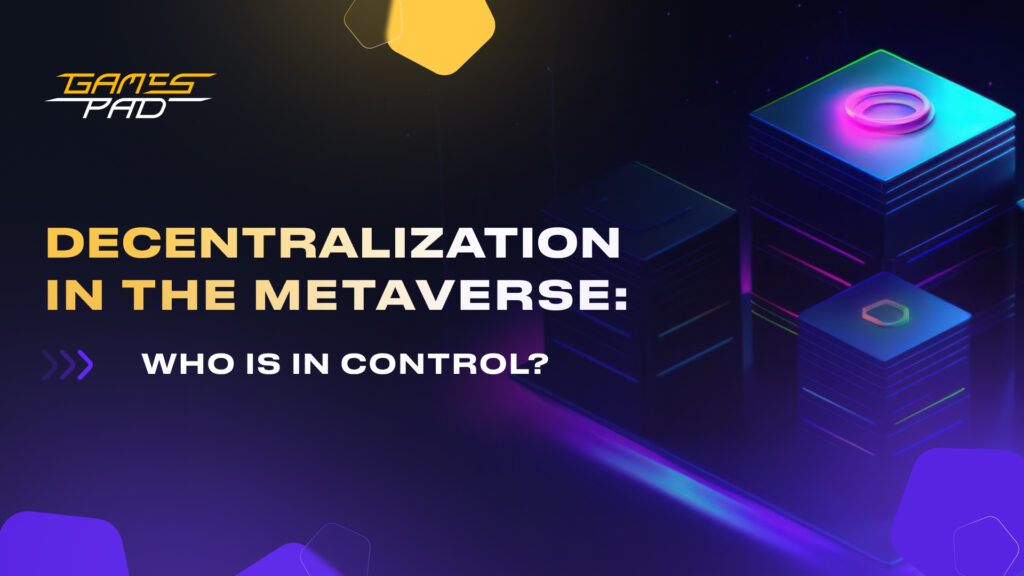
The metaverse is a collective virtual shared space that merges physical and virtual reality. It’s a digital universe that comprises interconnected virtual worlds, where users can interact with computer-generated environments and other users in real-time. The metaverse encompasses a wide range of technologies, including augmented reality (AR), virtual reality (VR), and the internet, creating a seamless, immersive experience thanks to immersive technologies.
But who controls the metaverse? Who is responsible for its integrity, safety, and friendliness to all the users? The metaverse basics and some insights into the possible options of its governance are explained in the article.

https://www.freepik.es/foto-gratis/conexion-red-internet-negocios-global-iot-internet-cosas-bus-concepto-inteligencia-negocios_49396320.htm#query=metaverse&position=2&from_view=search&track=sph&uuid=fcd78fb1-4c98-4c2b-9314-1a43cbef3f30
The concept of decentralization plays a crucial role in the development and evolution of the metaverse and its governance.
Decentralization, in the context of the metaverse, involves distributing control and ownership across a network of participants rather than being concentrated in a single authority. Decentralization plays a significant role in metaverse governance, influencing how decisions are made, rules are established, and the overall structure of the virtual environment is maintained. Here’s how decentralization contributes to metaverse governance.
Decentralized systems of a metaverse platform often use blockchain technology to establish ownership of virtual assets in the virtual space (such as digital real estate, in-game items such as digital avatars and other in-game items, or virtual currency). This ownership is secured through cryptographic keys, giving users more control over their digital possessions.
Decentralization facilitates interoperability between different virtual worlds and platforms within the metaverse. This interoperability ensures that governance mechanisms can be applied across different virtual worlds and platforms, fostering a cohesive metaverse experience. Users can seamlessly move assets or characters from one virtual environment to another, fostering a more open and connected metaverse experience that facilitates social interaction and other activities from which users benefit in the physical world.
Users can participate in governance processes that impact the entire metaverse ecosystem, not just a specific platform. This cross-platform governance helps create unified rules and standards that benefit the entire decentralized metaverse.
By distributing control, decentralization helps in resisting censorship. In a decentralized metaverse, there’s no single authority that can dictate content or restrict access, promoting freedom of expression and creativity while protecting at the same time intellectual property rights. Since governance decisions are distributed across a network, it becomes difficult for a single entity or authority to control or manipulate the rules and content within the metaverse.
Decentralized autonomous organizations (DAOs) are emerging as a key element in metaverse governance. These are self-executing smart contracts with rules encoded on a blockchain, allowing community members to collectively make decisions regarding the development and management of the virtual space.
These contracts, powered by blockchain technology, enable the creation of immutable rules within the virtual world. Once established, these rules cannot be easily altered, providing transparency and predictability in governance processes. Smart contracts can automatically execute predefined rules and agreements without the need for intermediaries. This automation reduces the reliance on centralized authorities for governance enforcement, making the metaverse more self-regulating.

Decentralization empowers users by giving them greater control over their virtual experiences. Users own their digital assets, have a say in governance decisions, and are less susceptible to arbitrary decisions by a central authority.
Blockchain, a fundamental technology in decentralization, promotes transparency. All transactions and changes within the metaverse can be recorded on a public ledger, providing visibility into the actions of both users and developers thus fostering data security.
Decentralization enhances security by eliminating single points of failure in this increasingly complex space. Distributed ledgers and consensus mechanisms make it more difficult for malicious actors to compromise the integrity of the metaverse, fostering trust among users.
Decentralized governance structures, often facilitated by DAOs, enable dynamic decision-making. DAOs are entities, governance frameworks represented by rules encoded as a computer program that is transparent, controlled by the organization members, and not influenced by a central government. In the metaverse, DAOs can be used to give users a direct say in decision-making processes, allowing them to collectively determine rules, features, and improvements.
Some metaverse platforms utilize governance tokens, allowing users to vote on proposals in the virtual world based on the number of tokens they hold. This token-based governance ensures that individuals with a higher stake have more influence, aligning decision-making with the economic interests of the participants. Users who contribute to the development and improvement of the metaverse, whether through content creation, innovation, or community engagement, may receive governance tokens as rewards. This encourages a vibrant and engaged community, leading to more effective governance.
In conclusion, decentralization is a foundational principle that shapes the metaverse’s governance, fostering a more inclusive, open, and resilient digital environment. It empowers users, enhances transparency, and enables a dynamic form of governance that aligns with the decentralized nature of the metaverse itself.

Decentralization in the context of virtual space, particularly in the metaverse, refers to the distribution of control, authority, and decision-making across a network of participants rather than being concentrated in a single central entity. It involves reducing reliance on a central governing body or server and instead relies on distributed technologies, such as blockchain, to ensure that no single party has complete control over the virtual environment.
In traditional virtual environments, control is often centralized in the hands of a specific company or entity. This central authority governs aspects such as asset ownership, content moderation, and rule enforcement within the digital space. Users typically rely on this central authority for security, transactions, and overall governance, leading to potential issues like censorship, lack of transparency, and limited user empowerment.
With the advent of blockchain technology and decentralized protocols, there’s a shift toward more distributed and peer-to-peer control in virtual environments. Blockchain allows for the creation of decentralized applications (DApps) and smart contracts, enabling users to interact directly with each other without intermediaries. Ownership of digital assets can be recorded on a blockchain, granting users greater control and autonomy.
Even though decentralization comes with some trade offs, it offers a lot of benefits by allowing users to overcome some complex issues of the physical world. Among all the benefits that decentralized metaverse governance offers, the following ones are the most significant.
Metaverse participants have greater ownership and control over their digital assets, such as virtual currency, items, or even virtual real estate. This empowerment encourages active participation and investment in the virtual worlds.
Decentralization facilitates interoperability between different virtual worlds and platforms. Users can seamlessly transfer assets or characters from one decentralized virtual world to another, fostering a more interconnected increasingly complex decentralized version of the virtual space.
Decentralization reduces the risk of censorship as there is no single entity such as a government that can impose restrictions on user-generated content. This promotes freedom of expression and creativity within the digital space and is a significant shift in the development of a fair equal society.
Even though there is no doubt that the metaverse is the future of the virtual world, we still have to handle a lot of challenges before it can replace the physical world and become an environment sustainable in the long term. The main challenges are the following.
Scalability: Along with the challenges connected with the metaverse governance, the virtual world faces challenges related to scalability. As more users join a network, it may experience delays or increased transaction costs. Solving scalability issues without compromising decentralization and data security is a significant technological challenge.
User Education: Understanding and navigating aby complex ecosystem such as a virtual world can be complex for the average user. There’s a need for educational efforts to ensure better understanding by users and make sure that users can securely manage their digital assets and engage with decentralized platforms effectively allowing users to benefit from new forms of social interaction, extended economic activities, and other opportunities that such a platform may offer.
Regulatory uncertainty: Metavers often operate in a regulatory gray area. The government may struggle to establish clear guidelines for decentralized technologies, leading to uncertainties and potential legal challenges. This is why for now, the metaverse technology mostly relies on ethical principles and decentralized autonomous organizations consisting of stakeholders and users to ensure the needed safety level for each business and individual with the presence in virtual worlds.
Smart contract risks: Smart contracts, while powerful, are not immune to bugs or vulnerabilities. Flaws in smart contracts can lead to security issues or unintended consequences, highlighting the importance of thorough code audits and ongoing development.
The shift from centralized to decentralized control in virtual environments, as seen in the metaverse, brings about various benefits, including user empowerment, interoperability, and increased security. However, challenges such as scalability, user education, regulatory uncertainty, and smart contract risks need to be addressed for decentralized digital spaces to reach their full potential and have the sustainability level needed to survive.

In decentralized metaverse governance, ownership of virtual assets is facilitated through blockchain technology, often utilizing non-fungible tokens (NFTs). The participants of the virtual world have direct control and ownership of their digital possessions, whether it be virtual real estate, in-game items, or other digital assets.
Metaverse platforms may adopt decentralized models of metaverse governance, allowing users to participate in decision-making processes. Decentralized Autonomous Organizations (DAOs) are governance frameworks that enable network participants to propose and vote on changes to the metaverse’s rules, policies, and development plans.
Blockchain enables peer-to-peer transactions within a virtual world. Various stakeholders and participants can directly trade virtual assets or conduct transactions without intermediaries. This decentralization of transactions promotes efficiency, reduces fees, and empowers participants in economic activities.
Decentralization supports interoperability standards between different virtual worlds and platforms. Thanks to these technical standards, everybody can seamlessly move assets or characters across various decentralized virtual environments, fostering a more interconnected and open metaverse.
A decentralized metaverse is less prone to censorship, as there is no central authority controlling content. Users enjoy greater freedom of expression, and the virtual spaces become more resistant to external control or content restrictions.
Smart contracts, which are self-executing contracts with the terms of the agreement directly written into code, play a significant role in a decentralized metaverse. They automate and enforce rules, enabling trustless and secure transactions, agreements, and interactions.
Decentralization empowers the community within the metaverse. Participants actively participate in decision-making, content creation, and the development of the virtual space. This collaborative approach enhances user engagement and fosters a sense of ownership.
Understanding decentralization in the metaverse involves recognizing the transformative impact of distributed control, ownership, and governance. It brings forth opportunities for empowerment, innovation, and a more inclusive and user-driven virtual experience.
Cryptocurrencies serve as a native and decentralized form of digital currency within the metaverse. They enable seamless and borderless transactions between users across different virtual environments. Smart contracts, often built on blockchain platforms, automate and enforce the terms of agreements, allowing for trustless and secure interactions.
Cryptocurrencies are often used to represent ownership of virtual assets, such as virtual real estate, in-game items, or digital art, through non-fungible tokens (NFTs). Blockchain technology ensures secure and transparent ownership records. Metaverse users can trade, buy, or sell virtual assets directly using cryptocurrencies, reducing reliance on central authorities or intermediaries.
Cryptocurrencies, particularly those associated with blockchain networks, contribute to decentralized governance models in the metaverse. Most DAOs leverage cryptocurrencies and blockchain to allow network participants to take part in metaverse governance, and decision-making processes, shaping the rules and development of the virtual environment.
Cryptocurrencies empower stakeholders by providing financial autonomy. Network participants have control over their cryptocurrency wallets, enabling them to participate in the economy of the virtual world, make transactions, and engage in decentralized metaverse governance without reliance on traditional financial institutions.
Cryptocurrencies eliminate the need for intermediaries in financial transactions within the metaverse. All players and visitors to a virtual world can conduct peer-to-peer transactions with minimal fees, promoting efficiency and reducing the influence of centralized financial institutions.
Cryptocurrencies and virtual economies face regulatory challenges as governments grapple with how to classify and regulate these digital assets. Uncertainty in regulations can impact user confidence and the overall stability of virtual economies.
Cryptocurrencies are known for their price volatility, which can affect the value of virtual assets within the metaverse. Rapid and unpredictable price changes may lead to challenges in valuing and managing virtual economies.
Virtual economies are susceptible to security risks, including hacks and fraud, and it impacts the metaverse governance in a negative way. Instances of theft or manipulation of cryptocurrencies can undermine the trust and stability of the metaverse economy.
The distribution of cryptocurrencies and virtual assets may contribute to economic disparities within the metaverse. Early adopters or those with significant financial resources may have advantages, potentially leading to inequality.
Cryptocurrencies play a crucial role in governing the metaverse by facilitating transactions, enabling decentralized governance, and empowering all metaverse participants. However, challenges such as regulatory uncertainty, price volatility, security risks, economic disparities, and scalability issues need to be addressed to ensure the stability and sustainable growth of virtual economies within the metaverse.
The metaverse, a digital frontier where virtual and physical realities converge, is rapidly evolving, driven by the collective efforts of various stakeholders. From tech giants shaping the digital landscape to governments navigating regulatory frameworks, and communities influencing the cultural fabric, each participant plays a vital role in the metaverse’s development.
This exploration will identify and delve into the major players in the metaverse governance sector, examining their distinctive roles and the intricate power dynamics that shape metaverse governance specifically and the metaverse in general.
Tech companies
Pioneering technological innovation, companies like Meta (formerly Facebook), Google, Epic Games, and Roblox Corporation are at the forefront of developing immersive experiences and interconnected digital spaces within the metaverse. Thanks to such immersive technologies as augmented reality, virtual reality, and extended reality, these companies are attracting more attention and impacting the future development of the metaverse.
These tech giants drive innovation by developing and implementing cutting-edge technologies, influencing the infrastructure, standards, and overall user experience within the metaverse.
Governments
Governments worldwide, such as the Chinese government, and the ones in the United States, and European countries, hold influence in shaping the metaverse through regulatory decisions, policies, and the establishment of legal frameworks governing digital spaces. They navigate the legal landscape to ensure ethical and secure development within the metaverse.
User communities

Content creators, influencers, and the general user base collectively contribute to the vibrancy of different platforms working on the metaverse development. Their interactions, preferences, and creativity shape the social dynamics and content within virtual environments. They contribute to the metaverse’s content diversity, setting trends, and shaping cultural aspects. The general user base participates in virtual experiences, influencing social dynamics and community norms.
As the metaverse unfolds, the collaborative efforts and conflicts among these key players will define its trajectory. Understanding the distinct roles, responsibilities, and power dynamics within the metaverse provides valuable insights into the complex web of interactions propelling the digital frontier forward.
The metaverse, a digital frontier blending virtual and physical realities, presents a novel and complex landscape with its own set of governance challenges. As this digital universe evolves, questions surrounding virtual economies, regulatory frameworks, and user rights have surfaced, demanding innovative solutions.
In this section, we explore the distinctive governance challenges inherent in the metaverse, examining the intricacies of managing digital spaces, ensuring ethical practices, and fostering a global standard that preserves user rights and societal values. So, the unique governance challenges in the metaverse are the following.
Decentralized nature
The metaverse operates on decentralized principles, often leveraging blockchain technology. This decentralized nature challenges traditional governance models, necessitating new approaches to ensure accountability and security.
Virtual economies and digital assets
Virtual economies within the metaverse, driven by cryptocurrencies and non-fungible tokens (NFTs), pose challenges in terms of regulation, taxation, and stability. The unique nature of digital assets complicates traditional economic frameworks.
Content moderation and user conduct
Governing user conduct and content moderation in virtual spaces is a complex task. Determining acceptable standards and addressing issues like hate speech, harassment, and inappropriate content requires a delicate balance between freedom and responsibility.
Establishing regulatory frameworks for virtual economies is imperative to ensure fair practices, prevent fraud, ensure sustainability, and address economic disparities. Balancing innovation and stability in these novel economic systems is a challenge for both regulators and developers.
Governments worldwide are grappling with the task of creating regulatory governance frameworks for the metaverse. This involves navigating issues related to data privacy and data safety, intellectual property, and consumer protection to foster a secure and ethical digital environment.
Upholding user rights and privacy is critical in the metaverse. Determining ownership of digital assets, protecting personal data, and ensuring transparency in data practices are paramount to building trust among users.
Establishing global standards for interoperability is essential to facilitate seamless interactions between different virtual worlds. Common protocols and standards can enhance connectivity, ensuring a more unified and accessible metaverse.
The metaverse incorporates advanced technologies, including artificial intelligence (AI) and automation. Ethical guidelines are needed to address concerns related to AI-driven decisions, algorithmic bias, and the ethical use of automation within virtual environments.
With a diverse global user base, ensuring cultural sensitivity and inclusivity in the metaverse is crucial. Ethical guidelines should address cultural nuances, promoting a space where users from different backgrounds feel respected and represented.
In conclusion, navigating the governance challenges in the metaverse requires a collaborative effort involving technology developers, regulatory bodies, and user communities. Establishing global standards and ethical guidelines will be instrumental in fostering a metaverse that is not only innovative but also secure, fair, and respectful of individual rights and societal values. As this digital frontier continues to unfold, addressing these challenges will shape the trajectory of the metaverse and its impact on our interconnected digital future.
At the heart of decentralized governance in the metaverse lies blockchain technology. The decentralized and distributed ledger serves as the backbone, ensuring transparency, security, and immutability in transactions and ownership within virtual spaces. However, even in such a space, some open standards or rather some governing bodies are needed. Decentralized autonomous organizations perform this role and define the rules based on which a virtual world works.
DAOs are entities programmed through smart contracts, operating on blockchain networks. These decentralized entities enable collective decision-making, giving users direct involvement in the governance of the metaverse. DAOs exemplify the transition from centralized control to community-driven collaboration.
The Role of Smart Contracts in Self-Governing Virtual Spaces
Smart contracts embedded in DAOs automate decision-making processes within the metaverse. Through predefined rules and consensus mechanisms, users collectively define the development, rules, and policies governing virtual spaces. They can vote on proposals, suggest changes, and influence the development roadmap thus enabling a more democratic and community-driven virtual environment.
The integration of blockchain, DAOs, and smart contracts is fundamentally altering the dynamics of metaverse governance
. Users are no longer passive participants; they are empowered contributors with a direct say in the development and rules of the virtual spaces they inhabit. As we witness the evolution towards decentralized governance, the metaverse is becoming not just a digital frontier, but a user-centric ecosystem where autonomy, transparency, and collective decision-making redefine the very essence of digital interaction. This paradigm shift sets the stage for a metaverse where users are not merely inhabitants but active architects of their virtual destinies.

As the metaverse continues to unfold, the need for effective governance becomes increasingly paramount. In this dynamic digital frontier, collaboration across sectors emerges as a cornerstone for shaping a metaverse that is secure, inclusive, and aligned with the diverse needs of its inhabitants.
In this section, we will explore the significance of cross-sector collaboration, the establishment of consortiums and industry standards bodies, and the pivotal role of multi-stakeholder platforms in fostering a governance model that reflects the collective wisdom of varied perspectives within the metaverse.
Interconnected ecosystems
The metaverse, by its nature, encompasses diverse sectors, including technology, finance, entertainment, and government. Cross-sector collaboration acknowledges the interconnectedness of these domains and the necessity for a unified approach to governance.
Holistic problem-solving
Governance challenges in the metaverse often transcend individual sectors. Collaborative efforts bring together expertise from various fields, fostering holistic problem-solving that addresses the multifaceted nature of issues such as security, interoperability, and user rights.
Establishing consortiums and industry standards bodies
Consortiums and industry standards bodies serve as platforms for consensus building. Bringing together stakeholders from different sectors, these entities create frameworks and guidelines that promote interoperability, ethical practices, and common standards across the metaverse.
Collaborative bodies help align regulatory frameworks, ensuring that governance policies are not only comprehensive but also adhere to legal and ethical standards. This alignment is crucial for establishing a metaverse that operates within the bounds of regional and international regulations.
Multi-stakeholder platforms ensure that governance decisions incorporate diverse perspectives. Users, tech companies, governments, and other stakeholders actively participate in decision-making processes, fostering a metaverse that reflects the needs and values of a broad spectrum of users.
Inclusive governance empowers communities within the metaverse to actively contribute to its development. This community-driven approach ensures that the metaverse is shaped not only by technological advancements but by the collective aspirations and creativity of its diverse user base.
Multi-stakeholder platforms promote transparency and accountability in governance. With representatives from different sectors, decision-making processes become more transparent, and stakeholders hold each other accountable for the ethical and responsible development of the metaverse.
The governance of the metaverse demands a collaborative effort that transcends individual sectors and embraces the collective intelligence of diverse stakeholders. The establishment of consortiums, industry standards bodies, and multi-stakeholder platforms is not merely a strategic choice; it is a necessity for steering the metaverse toward a future that prioritizes security, inclusivity, and innovation. As we navigate the vast landscapes of this digital frontier, collaborative governance emerges as the compass guiding the metaverse toward a harmonious and user-centric evolution.
As the metaverse unfolds, its ethical underpinnings and user-centric design become paramount considerations in shaping a digital realm that is not only innovative but also inclusive and respectful of individual rights.
It is important to implement ethical guidelines that prioritize diversity and inclusivity, the significance of regular audits and third-party certifications for accountability, and the imperative of ensuring user-centric design and feedback mechanisms within metaverse governance. In the metaverse, a diverse global user base necessitates ethical guidelines that embody cultural sensitivity. Inclusive design principles should be embedded in the fabric of virtual spaces to ensure that users from all backgrounds feel represented and respected.
To promote fairness and prevent discrimination, ethical guidelines must incorporate anti-bias measures. Algorithms and AI within the metaverse should be designed to mitigate biases, fostering an environment that upholds the principles of equality and equity.
Regular audits of metaverse platforms and technologies are essential for accountability. These audits can assess adherence to ethical guidelines, data privacy standards, and the overall impact of virtual environments on users, ensuring transparency and trust.
Along with audits, third-party certifications serve as external validations of a platform’s commitment to ethical standards. These certifications, granted by impartial entities, enhance credibility and provide users with assurance regarding the platform’s ethical practices.
The ethical considerations and user-centric design of the metaverse are foundational elements in creating a digital space that aligns with societal values and respects the diverse perspectives of its users. By implementing ethical guidelines, conducting regular audits, seeking third-party certifications, and prioritizing user feedback in governance models, the metaverse can become a more inclusive, accountable, and responsive environment.
As we navigate this digital frontier, the commitment to ethics and user-centric principles becomes not only a responsibility but a cornerstone for a metaverse that truly serves the needs and aspirations of its global community.
The metaverse governance is a collaborative endeavor that requires a delicate balance between technological innovation and ethical considerations. As stakeholders navigate this dynamic landscape, the focus should remain on empowering users, fostering inclusivity, and building a digital realm that reflects the diverse and interconnected nature of our global society.
By addressing challenges, embracing decentralized principles, and upholding ethical standards, the metaverse has the potential to become a transformative and user-driven space for generations to come.
Would you like to start investing in the most impactful crypto gaming, NFT and metaverse projects with GamesPad? Learn how in this comprehensive tutorial!
Disclaimer. This material should not be construed as a basis for making investment decisions or as a recommendation to participate in investment transactions. Trading digital assets may involve significant risks and can result in the loss of invested capital. Therefore, you must ensure that you fully understand the risk involved, consider your level of experience, investment objectives, and seek independent financial advice if necessary.